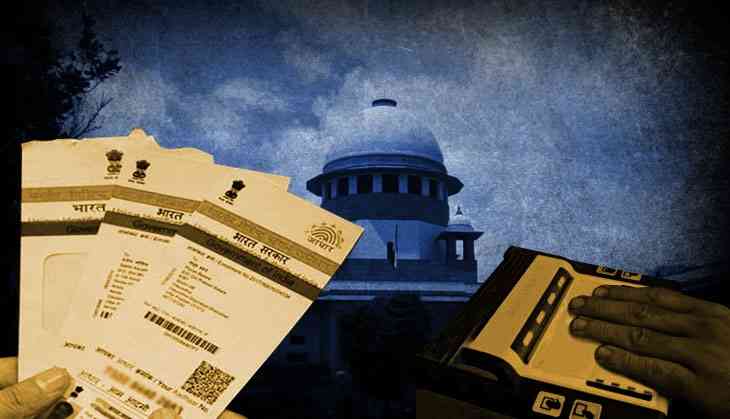Invasion of privacy a necessity at times: Centre makes its pro-Aadhaar stand

With a nine-judge Bench of the Supreme Court currently attempting to detangle the Aadhaar petitions and decide on whether privacy is a fundamental right, the Centre, in its arguments on 1 August, said that privacy, “invasion and governance” must be “statutorily regulated”.
This comes just a few days after attorney general KK Venugopal conceded that privacy is a fundamental right. But he added today that even privacy would need to be regulated like all other fundamental rights.
The crux of the Centre’s argument was that linking of Aadhaar card to PAN card would help curb the menace of shell companies and prevent a black money economy; that it would promote many social welfare schemes for the have-nots.
The Centre also argued that privacy as fundamental right would frustrate the goal of a ‘welfaristic’ model of the State – and that Aadhaar will aid in meeting the needs of the poorest of the poor strata of the society.
If the purpose of “invasion” (of privacy) is legitimate, then it should not be interfered with, the Centre said.
Parliamentary approval
Predictably, Maharashtra, one of the interveners in the matter along with other non-NDA states like West Bengal, Punjab and Puducherry (for which former Congress union minister Kapil Sibal concluded arguments), took the stand that parliament can enact a law to regulate a right and that only parliament is empowered to include right to privacy in the fundamental rights chapter of the Constitution of India, implying that right cannot be included by a judicial verdict.
This argument was advanced by senior counsel Arima Sundaram for Maharashtra when justice Rohington Nariman pointedly asked about the UN declaration of human rights 1948 to which India is a signatory, which had expressly recognised privacy as an “inalienable right”.
At this Sundaram contended: “Yes. There is no question of any interpretation in that except an amendment (to the Constitution) which parliament is alone empowered to (do)...”.
Bu this, he clearly indicated that no judicial interpretation to the existing constitutional or a statutory provision can bring in a change which would amount to judiciary enacting a law - a job of the legislature.
Suspended rights
Arguments on behalf of the Centre would continue which is as of today is against the recognition of privacy as an absolute right but should be regulated by statute.
Although the Centre concedes “certain aspects” of privacy are fundamental in nature, it, however, has to be “restricted” to existing fundamental rights.
For example, the right to property was a fundamental right, but the same was curtailed during Indira Gandhi’s regime and weeded out from the fundamental rights chapter of the Constitution.
Likewise, even the right to life becomes a suspended right during emergency.
But various counsel for the over 20 petitioners contended that the onus of proof of legitimacy in invading or curtailing right to privacy was on the government, when it sought so to invade or curtail that right.
A restricted right
If the court accepts the Centre’s approach, the right to privacy granted will be a restricted or regulated right. Another argument which may be controversial is that privacy is not suitable for a developing country like India and so judgments on law established in countries like the US or UK cannot be relied upon.
In the Indian context, it was argued, even basic services are yet to be available to a vast mass and for this reason too, a “laudatory” act like Aadhaar aimed at welfare services to the masses cannot be questioned in the name of “privacy invasion”.
But the apex bench pointed out that privacy was not an “elitist” concept or concern, but was of equal concern to the masses. It cited the example of forced sterilisation of slum dwellers in the name of population control. It also observed that if privacy was “not a fundamental right, then there would be a blanket sanction on anything the State can do.”
Maharashtra gave a written argument to the Bench largely contending that the Constituent Assembly (1947-1952) debated elaborately on the issue and kept it (privacy) away from the fundamental rights.
Public domain arguments
Venugopal cited the examples of issuance of passports, voter ID Card etc. in which too so much of personal details are collected. Why make a huge noise about Aadhaar card, he asked.
This, the AG contended, is “informational privacy” (which is) “not a constitutional guarantee.” Examples cited were the data disclosed by citizens for voter registration, biometrics for passports, and for property registration. “Census law” is another example cited containing confidentiality provisions.
The logical extension of this argument is that there can be no right to privacy for information already in the public domain.
First published: 1 August 2017, 21:38 IST
